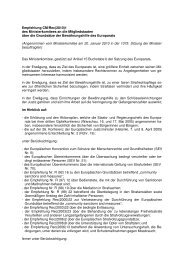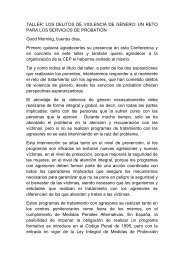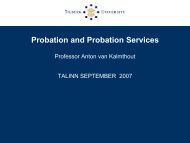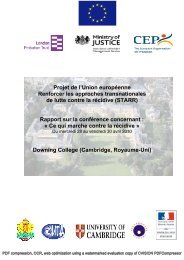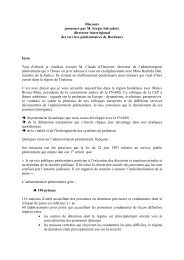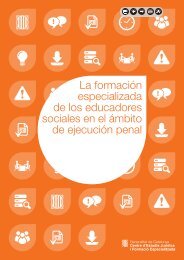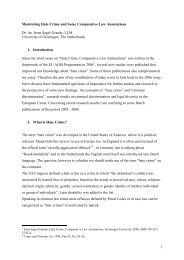ANNUAL REPORT - CEP, the European Organisation for Probation
ANNUAL REPORT - CEP, the European Organisation for Probation
ANNUAL REPORT - CEP, the European Organisation for Probation
You also want an ePaper? Increase the reach of your titles
YUMPU automatically turns print PDFs into web optimized ePapers that Google loves.
<strong>ANNUAL</strong> <strong>REPORT</strong>
Index<br />
3 Preface<br />
Marc Cerón i Riera, <strong>CEP</strong> President<br />
11 Strategic objective: Raise <strong>the</strong> profile of probation<br />
in <strong>European</strong> Union<br />
4 Activities<br />
11 Focus: <strong>CEP</strong> and <strong>the</strong> EU - interview with<br />
Patrick Madigou<br />
5 Strategic objective: Unite organisations and<br />
individuals who share similar principles<br />
5 Focus: Slovenia joins <strong>CEP</strong> - interview with<br />
Slava Novak<br />
6 Focus: University of Edinburgh joins<br />
<strong>CEP</strong> network - interview with Bill Whyte<br />
12 Focus: <strong>CEP</strong> <strong>Probation</strong> values versus<br />
Recommendation on <strong>Probation</strong> of <strong>the</strong> Council<br />
of Europe - interview with Ilina Taneva<br />
14 Reviewing future options <strong>for</strong> <strong>CEP</strong><br />
15 Income and expenditure<br />
7 Strategic objective: Enhance <strong>the</strong> professionalisation<br />
of <strong>the</strong> sector of probation in Europe<br />
8 Focus: <strong>CEP</strong> and <strong>the</strong> <strong>European</strong> Union’s<br />
Framework Decision on probation - interview<br />
with Leo Tigges<br />
9 Focus: The Conference on Recruitment and<br />
Training of <strong>Probation</strong> Practitioners in Agen -<br />
interview with Brian Stout<br />
<strong>CEP</strong> <strong>ANNUAL</strong> <strong>REPORT</strong> 2009 2
Preface<br />
On an annual basis, <strong>CEP</strong> presents<br />
an account of our activities <strong>for</strong> <strong>the</strong><br />
previous year. In this document,<br />
which is our first Annual Report,<br />
we outline our achievements <strong>for</strong><br />
2009. 2009 was a challenging and<br />
exciting year <strong>for</strong> <strong>CEP</strong> mainly due to<br />
three interlinked issues:<br />
Firstly, <strong>the</strong> mandate from Tallinn’s<br />
General Assembly in 2007 was an<br />
extensive one and this meant that<br />
we had much to do; participating<br />
in a lot of activities across a range<br />
of diverse areas. We organised five<br />
conferences and expert meetings<br />
which had been identified as topics<br />
of interest by our members:<br />
• Best practices in capacity building;<br />
• Funding innovation and collaboration<br />
in probation;<br />
• Electronic Monitoring;<br />
• Implementation of <strong>the</strong> Framework<br />
Decision on <strong>Probation</strong>;<br />
• Recruitment and Training of <strong>Probation</strong><br />
Practitioners.<br />
We were also active, both in Brussels<br />
and Strasbourg, <strong>for</strong>ging closer<br />
links at a <strong>European</strong> level and we<br />
believe that <strong>CEP</strong> is increasingly<br />
well placed to play a strong role in<br />
<strong>the</strong> developments in probation at a<br />
<strong>European</strong> level.<br />
We focused on improving our communication<br />
tools, investing more<br />
resources on our communication<br />
and IT infrastructure, especially our<br />
website and electronic newsletter.<br />
We also continued to progress <strong>the</strong><br />
Register of Experts and facilitated<br />
<strong>the</strong> distribution of <strong>the</strong> book <strong>Probation</strong><br />
in Europe funded by <strong>the</strong> Dutch<br />
foundation Stichting Nationale<br />
Reclasseringsactie and <strong>the</strong> Ministry<br />
of Justice of <strong>the</strong> Ne<strong>the</strong>rlands.<br />
Much of our ef<strong>for</strong>ts are spent on<br />
enhancing <strong>the</strong> professionalisation<br />
of <strong>the</strong> probation sector and we<br />
were active in working as partners<br />
in <strong>the</strong> establishment of a number of<br />
special <strong>European</strong> projects. We participated<br />
in several conferences and<br />
expert meetings held across Europe.<br />
Secondly, <strong>the</strong> Board was faced<br />
with a number of challenges driven<br />
by <strong>the</strong> expansion of its activity, <strong>the</strong><br />
increasing importance of <strong>the</strong> <strong>CEP</strong><br />
role in <strong>the</strong> sector of probation, and<br />
<strong>the</strong> relevance of probation as a valued<br />
option in <strong>the</strong> field of justice.<br />
The work to ensure <strong>the</strong> <strong>CEP</strong> organisation<br />
is able to adapt effectively<br />
was undertaken during <strong>the</strong> regular<br />
Board meetings under <strong>the</strong> vigilant<br />
leadership of <strong>the</strong>n president Patrick<br />
Madigou.<br />
Thirdly, during <strong>the</strong> year <strong>the</strong> effects<br />
of <strong>the</strong> economic crisis, beginning<br />
in 2008, impacted on probation<br />
services across Europe and on all<br />
our members as a consequence.<br />
<strong>CEP</strong> was sensitive to this context<br />
and has taken all possible measures<br />
to reduce costs and increase efficiency.<br />
This economic reality underpinned<br />
<strong>the</strong> proposals that would be<br />
considered by <strong>the</strong> General Assembly<br />
in Malaga in 2010.<br />
I hope that in <strong>the</strong> following chapters<br />
you will find in<strong>for</strong>mation of interest<br />
to you and at <strong>the</strong> same time that<br />
you get a sense of <strong>the</strong> enthusiasm<br />
and commitment of <strong>CEP</strong>’s staff, <strong>the</strong><br />
Board chaired by president Patrick<br />
Madigou, and <strong>the</strong> General Secretary,<br />
Leo Tigges, all of whom worked tirelessly<br />
to achieve our mission: to be<br />
useful to our members in <strong>the</strong> task of<br />
promoting and implementing probation<br />
across Europe.<br />
Marc Cerón i Riera<br />
<strong>CEP</strong> President<br />
<strong>CEP</strong> <strong>ANNUAL</strong> <strong>REPORT</strong> 2009 3
Activities<br />
<strong>CEP</strong> is <strong>the</strong> <strong>European</strong> organisation <strong>for</strong> probation. It believes that a society built<br />
on <strong>the</strong> principles of social inclusion provides <strong>the</strong> best protection <strong>for</strong> communities<br />
from <strong>the</strong> harm and distress caused by crime. Committed to unite organisations<br />
and individual persons all over Europe sharing <strong>the</strong>se same principles, <strong>CEP</strong> aims<br />
to enhance <strong>the</strong> professionalisation of <strong>the</strong> probation sector and to raise <strong>the</strong><br />
profile of probation at a national and a <strong>European</strong> level.<br />
This Annual Report 2009 provides an overview of <strong>the</strong> activities of <strong>CEP</strong> in 2009,<br />
classified by <strong>the</strong> three main strategic objectives. The report is published digitally.<br />
Clickable links refer to relevant web pages.<br />
<strong>CEP</strong> <strong>ANNUAL</strong> <strong>REPORT</strong> 2009 4
Strategic objective:<br />
Unite organisations and individuals who share similar principles<br />
Specific objective<br />
Increase and widen <strong>the</strong> range of<br />
membership<br />
<strong>CEP</strong> worked not only towards<br />
obtaining <strong>the</strong> membership of <strong>European</strong><br />
countries not yet represented<br />
in <strong>the</strong> <strong>CEP</strong> network, but also of<br />
more <strong>European</strong> universities. This<br />
resulted in <strong>the</strong> memberships of Ministry<br />
of Justice of Slovenia, Epanodos<br />
(Greece), University <strong>for</strong> Applied<br />
Sciences Utrecht (The Ne<strong>the</strong>rlands),<br />
University of Edinburgh (Scotland)<br />
and two individual members.<br />
Specific objective<br />
<strong>Organisation</strong> of <strong>the</strong> General<br />
Assembly 2010<br />
In late 2009 <strong>the</strong> <strong>CEP</strong> office began<br />
<strong>the</strong> preparations <strong>for</strong> <strong>the</strong> General<br />
Assembly 2010, to be held<br />
in Malaga, Spain. A decision was<br />
taken to bring <strong>for</strong>ward <strong>the</strong> General<br />
Assembly and Conference from<br />
October to May 2010 so that <strong>the</strong><br />
events would be held during <strong>the</strong><br />
Spanish presidency of <strong>the</strong> EU. This<br />
shortened <strong>the</strong> preparation period<br />
considerably. The Spanish Ministry<br />
of Interior, <strong>the</strong> Autonomous Government<br />
of Catalonia and The Ministry<br />
of Justice of Portugal provided<br />
funds which allowed <strong>for</strong> <strong>the</strong> appointment<br />
of a project assistant to aid in<br />
<strong>the</strong> preparations <strong>for</strong> <strong>the</strong> event which<br />
were organised in close collaboration<br />
with <strong>CEP</strong>.<br />
Specific objective<br />
Create and support networks of<br />
Special Target Groups<br />
The preparations <strong>for</strong> an action plan<br />
<strong>for</strong> <strong>the</strong> Special Iinterest Group Foreign<br />
National Prisoners were started<br />
John Walters (Prisoners Abroad),<br />
Rolf Streng (Reclassering Nederland),<br />
Nick Hammond (London <strong>Probation</strong><br />
Trust) and Leo Tigges (<strong>CEP</strong><br />
Secretary General) to place <strong>the</strong><br />
issue of <strong>for</strong>eign national prisoners<br />
firmly on <strong>the</strong> agenda of probation in<br />
Europe. One working group met in<br />
London to design <strong>the</strong> action plan.<br />
Focus: Slovenia joins <strong>CEP</strong><br />
The Prison Administration of <strong>the</strong> Ministry of Justice of Slovenia was added to <strong>the</strong> <strong>CEP</strong> network<br />
in October 2009. The Prison Administration attended conferences of <strong>the</strong> <strong>CEP</strong> in 2003 and 2004,<br />
so becoming a member was <strong>the</strong> next step.<br />
“The Prison Administration was<br />
founded in 1995, but community<br />
services as an alternative <strong>for</strong> defined<br />
prison sentences only began after<br />
2000”, tells Slava Novak, Secretary<br />
at <strong>the</strong> Head Office, International<br />
Cooperation Prison Administration.<br />
“Slovenia does not have a single<br />
organized <strong>Probation</strong> Service like<br />
elsewhere in Europe. <strong>Probation</strong><br />
activities and measures are executed<br />
by a number of organisations.<br />
Most activities however are carried<br />
out by social work centers, which<br />
are organized as local community<br />
public services in <strong>the</strong> field of social<br />
assistance,” says Novak.<br />
“So <strong>the</strong>re are two Ministries closely<br />
involved in <strong>the</strong> sector of probation<br />
in our country. One of <strong>the</strong> important<br />
tasks <strong>for</strong> us at <strong>the</strong> moment is how<br />
to streamline <strong>the</strong> organization of<br />
probation between <strong>the</strong> two ministries.<br />
In this regard we would hope<br />
to draw on <strong>the</strong> knowledge, experiences<br />
and best practices of o<strong>the</strong>r<br />
probation services abroad. There<strong>for</strong>e<br />
we highly value <strong>the</strong> inclusion in<br />
<strong>the</strong> international network of <strong>CEP</strong>.”<br />
<strong>CEP</strong> <strong>ANNUAL</strong> <strong>REPORT</strong> 2009 5
Strategic objective:<br />
Unite organisations and individuals who share similar principles<br />
Focus: The University of Edinburgh joins <strong>the</strong> <strong>CEP</strong> network<br />
For Bill Whyte, Professor of Social Work Studies in Criminal and Youth Justice, it was a logical<br />
step <strong>for</strong> <strong>the</strong> University of Edinburgh to join <strong>the</strong> <strong>CEP</strong> network. <strong>CEP</strong> and <strong>the</strong> University’s Criminal<br />
Justice Social Work Development Centre (CJSW) had been connected through events and<br />
conferences; <strong>the</strong> University was welcomed as a member in 2009.<br />
Bill Whyte<br />
Locally, <strong>the</strong> CJSW Centre has played<br />
a key role in advising <strong>the</strong> Scottish<br />
government on <strong>the</strong> shape and direction<br />
of social work services in youth<br />
and criminal justice (probation) in<br />
Scotland. “Scotland has a distinctive<br />
approach to probation and<br />
youth justice compared to England<br />
and Wales,” says Professor Whyte.<br />
“In <strong>the</strong> early ‘90’s I had suggested<br />
to <strong>the</strong> Assistant Chief Inspector of<br />
Social Work that I might be a Scottish<br />
representative to <strong>the</strong> <strong>CEP</strong>, but<br />
it was considered a UK jurisdiction<br />
responsibility. While <strong>the</strong> government<br />
of Scotland was not involved<br />
in <strong>CEP</strong> I kept my interest and when<br />
<strong>CEP</strong> sought academic members,<br />
we were delighted to join.”<br />
Through its <strong>CEP</strong> membership, <strong>the</strong><br />
Centre hopes to contribute on a<br />
<strong>European</strong> level to research and<br />
practice related developments.<br />
“The <strong>CEP</strong> is beginning to show<br />
its potential to influence policy<br />
and practice. With <strong>the</strong> link to academic<br />
research, its clout will also<br />
be rooted in <strong>the</strong> academic world,”<br />
states Professor Whyte. Professor<br />
Whyte describes <strong>the</strong> task of CJSW<br />
as ‘action research’: <strong>the</strong> implementation<br />
of knowledge to practice. “We<br />
support probation practice in Scotland<br />
but also support <strong>the</strong> evaluation<br />
of this practice since it has become<br />
clear that effective practitioners<br />
evaluate <strong>the</strong>mselves regularly. This<br />
way <strong>the</strong>y generate <strong>the</strong>ir own data<br />
and contribute to improvements in<br />
practice.”<br />
Fur<strong>the</strong>rmore, says Professor Whyte,<br />
governments are looking <strong>for</strong> in<strong>for</strong>mation<br />
on <strong>the</strong> methods and effectiveness<br />
of probation. Academic<br />
analysis can provide some of this<br />
empirical evidence. A government<br />
can work in partnership with an<br />
independent organisation like <strong>the</strong><br />
University of Edinburgh by funding<br />
relevant research.<br />
<strong>Probation</strong> has increasingly become<br />
a priority of <strong>the</strong> EU and <strong>the</strong> work of<br />
probation has been given a higher<br />
profile. In Professor Whyte’s opinion,<br />
now is <strong>the</strong> time <strong>for</strong> <strong>the</strong> <strong>CEP</strong> and <strong>the</strong><br />
academic world to support <strong>the</strong> probation<br />
sector. Scholars can do so by<br />
producing more sophisticated evidence,<br />
comparative data and contribute<br />
to <strong>the</strong> exchange and transfer<br />
of knowledge. “<strong>Probation</strong> needs<br />
a strong sense of where it stands<br />
based on evidence and values,” says<br />
Professor Whyte. In <strong>the</strong> partnership<br />
with <strong>CEP</strong>, <strong>the</strong> CJSW Centre and <strong>the</strong><br />
University of Edinburgh hope to contribute<br />
to this process.<br />
<strong>CEP</strong> <strong>ANNUAL</strong> <strong>REPORT</strong> 2009 6
Strategic objective:<br />
Enhance <strong>the</strong> professionalisation of <strong>the</strong> sector of probation in Europe<br />
Specific objective<br />
Enhance innovation in probation<br />
In 2009 <strong>CEP</strong> participated in <strong>the</strong> following<br />
projects.<br />
<strong>European</strong> Union projects:<br />
• RIRP: Reducing Influences that<br />
Radicalize Prisoners Project to<br />
counter radicalisation of prisoners<br />
and offenders under probation<br />
supervision.<br />
Project steerage, co-organisation,<br />
participation at <strong>the</strong> expert meeting<br />
London in October 2009 and preparations<br />
<strong>for</strong> expert meeting in January<br />
2010 in Segovia, Spain.<br />
• STARR: Streng<strong>the</strong>ning Transnational<br />
Approaches to Reduce reoffending.<br />
Project on <strong>the</strong> “What works”-<br />
approach in probation. Project steerage,<br />
co-organisation and preparation<br />
conference in Cambridge, which<br />
took place in April 2010.<br />
• DOMICE: Developing Offender Management<br />
In Corrections in Europe.<br />
Development of common <strong>European</strong><br />
case management. Project steerage.<br />
Supported <strong>European</strong> Union project<br />
bids:<br />
• <strong>CEP</strong> participated in projects of<br />
which <strong>the</strong> applications were submitted<br />
in 2009, but were to be decided<br />
upon in 2010.<br />
• Circles Europe: Toge<strong>the</strong>r <strong>for</strong> Safety:<br />
implementing a new approach to<br />
supervise sex offenders and identify<br />
<strong>the</strong> conditions under which <strong>the</strong> programme<br />
can be implemented successfully<br />
in o<strong>the</strong>r jurisdictions.<br />
• Statistics on Sanctions and Measures<br />
within <strong>the</strong> criminal justice<br />
process (STATSAM): developing a<br />
common <strong>European</strong> methodology<br />
<strong>for</strong> statistics in probation.<br />
• Preparation of <strong>the</strong> practical implementation<br />
of <strong>the</strong> framework decision<br />
on <strong>the</strong> mutual recognition of<br />
probation measures: Implementation<br />
of <strong>the</strong> EU Framework Decision<br />
2008/947/JHA.<br />
• Improving knowledge in practice of<br />
restorative justice (in criminal matters)<br />
by international comparative<br />
research – identifying and promoting<br />
best practices in Restorative Justice.<br />
• Electronic Monitoring and House<br />
Arrest as an Effective Instrument of<br />
Crime Prevention. Implementation<br />
of Electronic Monitoring in Czech<br />
Republic.<br />
Council of Europe Actions:<br />
• SPACE II: <strong>the</strong> collection of statistical<br />
data on community sanctions<br />
and measures in Council of<br />
Europe member states. Supporting,<br />
<strong>for</strong>mulating and disseminating<br />
a questionnaire on statistical data<br />
collection by national probation<br />
services .<br />
Academic research:<br />
• Membership Editorial Board <strong>European</strong><br />
Journal of <strong>Probation</strong>: Preparation<br />
and follow up.<br />
• ESC network: Facilitation of academic<br />
research to support <strong>the</strong> <strong>European</strong><br />
Society of Criminology (ESC)<br />
working group on Community Sanctions<br />
in Europe.<br />
Specific objective<br />
Enhance knowledge exchange<br />
between members<br />
The <strong>CEP</strong> website is an important<br />
means of communication and a<br />
vehicle <strong>for</strong> <strong>the</strong> exchange of in<strong>for</strong>mation.<br />
In 2009 <strong>the</strong> website was<br />
renewed and underwent several<br />
changes. New sections were added,<br />
such as <strong>the</strong> funding programs section<br />
and <strong>the</strong> Register of Experts<br />
online registration <strong>for</strong>m.<br />
The <strong>CEP</strong> newsletter was published<br />
five times in 2009, containing interviews<br />
and articles on developments<br />
in probation in Europe.<br />
The Register of Experts was fur<strong>the</strong>r<br />
developed in 2009 and one meeting<br />
of <strong>the</strong> panel took place in London.<br />
This is an initiative in which<br />
<strong>CEP</strong> facilitates <strong>the</strong> matching of<br />
probation specialists with countries<br />
looking to develop <strong>the</strong>ir probation<br />
practice.<br />
<strong>CEP</strong> fur<strong>the</strong>r promoted <strong>the</strong> dissemination<br />
of <strong>the</strong> book <strong>Probation</strong><br />
in Europe. In addition it started <strong>the</strong><br />
preparations to publish summaries<br />
<strong>CEP</strong> <strong>ANNUAL</strong> <strong>REPORT</strong> 2009 7
Strategic objective:<br />
Enhance <strong>the</strong> professionalisation of <strong>the</strong> sector of probation in Europe<br />
of <strong>the</strong> country chapters of <strong>the</strong> book<br />
on <strong>the</strong> <strong>CEP</strong> website.<br />
<strong>CEP</strong> and <strong>the</strong> University of Birmingham<br />
jointly prepared <strong>the</strong> publication<br />
of a journal on probation in<br />
Europe, called EuroVista, journal<br />
on probation and community justice.<br />
<strong>CEP</strong> attended <strong>the</strong> Editorial<br />
board meeting in Birmingham. It<br />
provided articles and maintained<br />
contact with authors.<br />
<strong>CEP</strong> provided bursaries to representatives<br />
of five organisations to<br />
attend <strong>CEP</strong> events and connect<br />
with colleagues in probation <strong>for</strong>m all<br />
around Europe.<br />
During <strong>the</strong> year 2009, <strong>CEP</strong> organised<br />
five conferences in cooperation<br />
with its local partner organisations:<br />
Sofia (BG) in January<br />
Topic: Capacity building<br />
Cambridge (GB) in March<br />
Topic: Funding Opportunities <strong>for</strong><br />
<strong>Probation</strong><br />
Egmont aan Zee (NL) in May<br />
Topic: Electronic Monitoring<br />
Dublin (IRL) in October<br />
Topic: EU Framework Decision<br />
Agen (F) in December<br />
Topic: Recruitment and Training of<br />
<strong>Probation</strong> Officers<br />
Focus: <strong>CEP</strong> and <strong>the</strong> <strong>European</strong> Union Framework Decision<br />
on probation<br />
Late 2008, <strong>the</strong> Framework Decision on probation (2008/947/JHA) was adopted by <strong>the</strong> EU. <strong>CEP</strong><br />
Secretary General, Leo Tigges, worked on <strong>the</strong> communication of <strong>the</strong> implications of <strong>the</strong>se<br />
policies to <strong>European</strong> Union member states, in particular to <strong>CEP</strong> members. The EU Framework<br />
Decision promotes <strong>the</strong> implementation of a system where offenders can undergo <strong>the</strong>ir sentence<br />
in <strong>the</strong>ir <strong>European</strong> home country when <strong>the</strong>y been sentenced abroad to a non-custodial sanction.<br />
This mechanism can help to avoid<br />
unnecessary prison terms of <strong>for</strong>eigners<br />
which may currently be considered<br />
unavoidable because <strong>the</strong><br />
person has no residence in <strong>the</strong> state<br />
of conviction. “The Framework Decision<br />
is a sign of <strong>the</strong> EU’s commitment<br />
to probation activities, especially<br />
in <strong>the</strong> <strong>for</strong>m of alternatives to<br />
custodial sentences; <strong>CEP</strong> applauds<br />
this development,” says Leo Tigges.<br />
It is <strong>CEP</strong>’s goal to bring its members<br />
toge<strong>the</strong>r in <strong>the</strong>ir attempts to<br />
implement this Framework Decision.<br />
“On <strong>the</strong> one hand we aim to raise<br />
awareness among members of <strong>the</strong><br />
upcoming changes, on <strong>the</strong> o<strong>the</strong>r<br />
hand <strong>CEP</strong> provides a plat<strong>for</strong>m to<br />
share in<strong>for</strong>mation,” says Tigges. A<br />
specific example of such a meeting<br />
is <strong>the</strong> conference held in Dublin, Ireland,<br />
in October 2009. “At <strong>the</strong> Dublin<br />
conference on <strong>the</strong> implementation of<br />
<strong>the</strong> Framework Decision on <strong>Probation</strong>,<br />
<strong>CEP</strong> became aware of a Belgian<br />
initiative to start a project which<br />
would support <strong>the</strong> implementation<br />
process of <strong>the</strong> new probation regulations.<br />
1 Immediately we wanted to<br />
work toge<strong>the</strong>r in this plan.”<br />
The needs of legislators in Europe<br />
to communicate about <strong>the</strong> Framework<br />
Decision and its consequences<br />
proved to be significant. <strong>CEP</strong>’s website<br />
is used to facilitate discussion<br />
<strong>CEP</strong> <strong>ANNUAL</strong> <strong>REPORT</strong> 2009 8
Strategic objective:<br />
Enhance <strong>the</strong> professionalisation of <strong>the</strong> sector of probation in Europe<br />
and <strong>the</strong> dissemination of knowledge.<br />
The presentations and results of <strong>the</strong><br />
Dublin meeting can be accessed on<br />
<strong>the</strong> website. The <strong>for</strong>um on <strong>the</strong> website<br />
offers an opportunity <strong>for</strong> members<br />
to meet and discuss issues<br />
concering <strong>the</strong> Framework Decision<br />
implementation in <strong>the</strong> virtual world.<br />
Some EU member states have<br />
already begun to address <strong>the</strong><br />
upcoming changes, and have<br />
grasped <strong>the</strong> implications more easily<br />
than o<strong>the</strong>rs. According to Tigges,<br />
hosting country Ireland is in many<br />
respects ahead in <strong>the</strong> preparation<br />
of <strong>the</strong> implementation of <strong>the</strong> Framework<br />
Decision, as a result of David<br />
O’Donovan’s ef<strong>for</strong>ts (<strong>for</strong>mer Board<br />
Member of <strong>CEP</strong>). “Some national<br />
governments have not even begun<br />
<strong>the</strong> legislative process and I fear that<br />
some of <strong>the</strong>m might not meet <strong>the</strong><br />
deadline of December 2011,” says<br />
Tigges. The Framework Decision<br />
is an complicated document and<br />
<strong>CEP</strong> aims to help <strong>the</strong>se members<br />
by exchanging in<strong>for</strong>mation and participating<br />
in or organising projects to<br />
achieve a timely and well prepared<br />
system of transfer of probation<br />
supervision. Based on <strong>the</strong> reactions<br />
of <strong>the</strong> delegates, <strong>the</strong> activities undertaken<br />
in 2009 proved to be a good<br />
starting point <strong>for</strong> probation services<br />
in relation to <strong>European</strong> developments.<br />
“What is exciting is that this<br />
Framework Decision gives a totally<br />
different dimension to <strong>the</strong> <strong>European</strong><br />
cooperation in <strong>CEP</strong>. In <strong>the</strong> future<br />
we will really cooperate in transferring<br />
individual cases. Acquiring a<br />
true and detailed understanding of<br />
each o<strong>the</strong>r’s probation system will<br />
no longer be something voluntarily<br />
but imperative <strong>for</strong> all <strong>CEP</strong> member<br />
Leo Tigges<br />
organisations. As such <strong>CEP</strong> will also<br />
need to change its view on ‘mutual<br />
exchange of in<strong>for</strong>mation’ as it was<br />
developed over <strong>the</strong> last thirty years.<br />
There’s no doubt that this process<br />
will result in a new approach of professionalising<br />
<strong>the</strong> sector of probation<br />
in Europe in <strong>the</strong> years to come.”<br />
1<br />
The project is entitled “Preparation of <strong>the</strong> practical implementation of <strong>the</strong> framework decision on <strong>the</strong> mutual recognition of probation<br />
measures” of <strong>the</strong> Federal Public Service Justice of Belgium, <strong>for</strong>merly known as <strong>the</strong> Ministry of Justice. The partnership resulted in <strong>the</strong><br />
conference in Durbuy, Belgium, in July 2010 and a map of <strong>European</strong> legislation and practices.<br />
Focus: The Conference on Recruitment and Training of<br />
<strong>Probation</strong> Practitioners in Agen<br />
“Harmonize probation training in Europe, share good practice and highlight new initiatives.”<br />
This was <strong>the</strong> goal of <strong>the</strong> <strong>CEP</strong> conference held in Agen, France, in December 2009, organized in<br />
conjunction with <strong>the</strong> École Nationale d’Administration Pénitentiaire.<br />
Throughout <strong>the</strong> conference <strong>the</strong>re<br />
were presentations and discussions<br />
about <strong>the</strong> training and selection of<br />
probation practitioners in Europe.<br />
Dr Brian Stout, Associate Head of<br />
School of Applied Social Sciences<br />
at De Mont<strong>for</strong>t University (DMU),<br />
provided <strong>the</strong> concluding presentation<br />
at <strong>the</strong> end conference and is<br />
looking back at <strong>the</strong>se two days.<br />
Since <strong>the</strong> recent developments in<br />
Europe, such as <strong>the</strong> implementa-<br />
<strong>CEP</strong> <strong>ANNUAL</strong> <strong>REPORT</strong> 2009 9
Strategic objective:<br />
Enhance <strong>the</strong> professionalisation of <strong>the</strong> sector of probation in Europe<br />
Brian Stout<br />
tion of <strong>the</strong> Framework Decision on<br />
probation and <strong>the</strong> implementation<br />
of <strong>the</strong> Bachelor/Master structure at<br />
higher education level, <strong>the</strong> possibilities<br />
<strong>for</strong> working in <strong>the</strong> probation<br />
sector in ano<strong>the</strong>r <strong>European</strong> country<br />
are increasing. There<strong>for</strong>e <strong>the</strong>re<br />
was a need <strong>for</strong> <strong>CEP</strong> members, to<br />
join toge<strong>the</strong>r to discuss and learn<br />
more about training across Europe.<br />
According to Dr. Stout, who through<br />
his work is involved in <strong>the</strong> teaching<br />
of probation students and <strong>the</strong> shaping<br />
of <strong>the</strong> probation curriculum in <strong>the</strong><br />
UK, it is of great importance to create<br />
a common training framework.<br />
“The framework could contribute<br />
to <strong>the</strong> achievement of a consolidating,<br />
effective and humane probation<br />
service in Europe. It would also be<br />
of great benefit to those countries<br />
where probation work is in an early<br />
stage of development, providing a<br />
strong foundation <strong>for</strong> developing a<br />
common training programme, an<br />
opportunity <strong>for</strong> <strong>the</strong> sharing of learning<br />
and best practice.”<br />
The presentations during <strong>the</strong> conference<br />
made clear that probation is<br />
delivered in a wide variety of ways<br />
in EU member states. In some countries<br />
probation training is located in<br />
social work, in o<strong>the</strong>rs it is located<br />
in <strong>the</strong> prison service, and in o<strong>the</strong>rs<br />
it is stand-alone. There are national,<br />
political reasons <strong>for</strong> <strong>the</strong>se differences<br />
and it is difficult to imagine<br />
those changing. “In my view, greater<br />
unity is <strong>the</strong> correct aim, ra<strong>the</strong>r than<br />
standardisation,” says Dr. Stout.<br />
In <strong>the</strong> main <strong>the</strong> discussions<br />
focussed on debate as to how<br />
greater unity could be achieved<br />
and how complex standardisation<br />
might be. Dr. Stout thinks <strong>the</strong>re are<br />
three potential obstacles in obtaining<br />
a <strong>European</strong> Curriculum: “One<br />
obstacle is that national training<br />
providers will tend to develop curricula<br />
with a view to national considerations.<br />
Ano<strong>the</strong>r obstacle might<br />
be a temptation to focus on points<br />
of difficulty or difference, ra<strong>the</strong>r<br />
than to look positively at what<br />
could be achieved toge<strong>the</strong>r and <strong>the</strong><br />
benefits of a <strong>European</strong> Curriculum.<br />
A third obstacle is that change is<br />
always difficult; countries where a<br />
curriculum is already established<br />
may be disinclined to reflect on its<br />
content. None<strong>the</strong>less greater unity<br />
is achievable through setting some<br />
clear principles and benchmarks,<br />
and by promoting best practice.”<br />
Dr. Stout concludes that <strong>the</strong> general<br />
conclusion of <strong>the</strong> conference<br />
was that a <strong>European</strong> Curriculum is a<br />
significant goal and one that would<br />
be possible to achieve. In addition<br />
everyone left <strong>the</strong> conference with a<br />
greater sense of what is happening<br />
in o<strong>the</strong>r <strong>European</strong> countries. Some<br />
participants met towards <strong>the</strong> end<br />
of <strong>the</strong> conference and agreed on<br />
<strong>the</strong> need to start a project group<br />
with several clearly defined tasks.<br />
“It is important to build upon <strong>the</strong><br />
successes of <strong>the</strong> conference and<br />
streng<strong>the</strong>n an enduring network. In<br />
continuation, <strong>CEP</strong> could be driving<br />
<strong>the</strong> agenda of curriculum development,<br />
and reminding all of us of <strong>the</strong><br />
importance of <strong>the</strong> <strong>European</strong> element<br />
of probation training.”<br />
<strong>CEP</strong> <strong>ANNUAL</strong> <strong>REPORT</strong> 2009 10
Strategic objective:<br />
Raise <strong>the</strong> profile of probation in Europe<br />
Specific objective<br />
Supporting members and nonmembers<br />
to raise <strong>the</strong> profile of<br />
probation on a national level<br />
<strong>CEP</strong> Board Members and Secretary<br />
General paid several visits to<br />
<strong>European</strong> countries with <strong>the</strong> aim of<br />
raising <strong>the</strong> profile of probation at a<br />
national level:<br />
Portugal in March<br />
Contribution: Speaking at a conference<br />
on <strong>the</strong> place of probation in<br />
<strong>the</strong> penal system.<br />
Germany in March<br />
Contribution: Speaking at a conference<br />
on <strong>the</strong> Market Re<strong>for</strong>m of <strong>Probation</strong><br />
Services.<br />
Isle of Man in April<br />
Contribution: Speaking at a conference<br />
on integrating community<br />
justice.<br />
Germany in April<br />
Contribution: Speaking at a conference<br />
on <strong>the</strong> management of offenders<br />
in resettlement programmes.<br />
Slovenia in September<br />
Contribution: Speaking at a conference<br />
of <strong>the</strong> <strong>European</strong> Society of<br />
Criminology; visit to <strong>the</strong> Ministry of<br />
Justice; interview with <strong>the</strong> press.<br />
Macedonia in September<br />
Contribution: Speaking at a workshop<br />
on <strong>the</strong> procedures <strong>for</strong> implementation<br />
of alternative measures<br />
to imprisonment.<br />
Russia in October<br />
Contribution: Speaking at a conference<br />
on promoting penal system<br />
re<strong>for</strong>ms in <strong>the</strong> Russian Federation.<br />
Italy in December<br />
Contribution: Speaking at a Conference<br />
on different <strong>Probation</strong> Systems<br />
in Europe.<br />
Specific objective<br />
Raise <strong>the</strong> profile of probation at<br />
a <strong>European</strong> level<br />
<strong>CEP</strong> attended two meetings of<br />
<strong>the</strong> Council <strong>for</strong> Penological Cooperation<br />
(PC-CP) of <strong>the</strong> Council<br />
of Europe in Strasbourg. During<br />
<strong>the</strong>se meetings <strong>the</strong> <strong>for</strong>mulation of<br />
<strong>the</strong> new <strong>European</strong> <strong>Probation</strong> Rules<br />
were discussed. <strong>CEP</strong> stimulated its<br />
members to respond to <strong>the</strong> draft of<br />
<strong>the</strong>se rules.<br />
<strong>CEP</strong> also represented <strong>the</strong> probation<br />
sector at <strong>the</strong> <strong>European</strong> Union in<br />
Brussels. <strong>CEP</strong> had regular contact<br />
with <strong>the</strong> EU Directorate General <strong>for</strong><br />
Jusitice, Freedom & Security, including<br />
a meeting with EU Vice-President<br />
and Commissioner <strong>for</strong> Justice,<br />
Freedom & Security Mr. Jacques<br />
Barrot, providing input <strong>for</strong> <strong>the</strong><br />
execution of <strong>the</strong> Stockholm programme<br />
on <strong>the</strong> basis of consultation<br />
round <strong>CEP</strong> members.<br />
Focus: Briefing ‘Brussels’<br />
In many aspects of <strong>the</strong> present-day society ‘Brussels’ plays an increasingly important role. In<br />
probation that is no different. “The most evident example is Framework Decision 2008/947/JHA,<br />
on <strong>the</strong> transfer of Alternative sanctions and <strong>Probation</strong> Measures”, recalls Patrick Madigou,<br />
<strong>CEP</strong> President from 2007-2010.<br />
“But also in all <strong>the</strong> EU initiatives to<br />
create a <strong>European</strong> Area of Justice,<br />
<strong>the</strong>re are many regulations which<br />
apply directly or indirectly to <strong>the</strong><br />
sector of probation. There<strong>for</strong>e, in<br />
2009, we logically decided to step<br />
up our contacts with <strong>the</strong> EU.”<br />
After <strong>the</strong> Framework Decision on<br />
probation was issued in December<br />
2008, it seemed obvious <strong>for</strong> <strong>CEP</strong> to<br />
meet with Mr. Jacques Barrot, EU<br />
Commissioner <strong>for</strong> Justice, Freedom<br />
& Security and Vice-President of <strong>the</strong><br />
EU. “We would like to present our<br />
<strong>CEP</strong> <strong>ANNUAL</strong> <strong>REPORT</strong> 2009 11
Strategic objective:<br />
Raise <strong>the</strong> profile of probation in Europe<br />
Leo Tigges, Jacques Barrot and<br />
Patrick Madigou<br />
organisation at <strong>the</strong> highest <strong>European</strong><br />
level”, explains Patrick Madigou.<br />
“Moreover, we also would like<br />
to discuss <strong>the</strong> priorities that our<br />
member organisations had identified<br />
in a consultation round that we<br />
had held in <strong>the</strong> autumn of 2008.”<br />
In January 2009 <strong>CEP</strong> met with Mr.<br />
Barrot and his cabinet at <strong>the</strong> Commission’s<br />
headquarter. “Mr. Barrot<br />
indicated that he was particularly<br />
interested in fur<strong>the</strong>r developing <strong>the</strong><br />
harmonisation of sanctions and<br />
alternative sanctions in <strong>the</strong> EU”,<br />
tells Patrick Madigou. “This would<br />
be one of <strong>the</strong> guiding principles of<br />
<strong>the</strong> EU Action plan <strong>for</strong> cooperation<br />
on judicial matters and home affairs<br />
in <strong>the</strong> period 2010-2014, known as<br />
<strong>the</strong> Stockholm programme. As such<br />
he invited <strong>CEP</strong> to give input <strong>for</strong> <strong>the</strong><br />
Stockholm programme.”<br />
In September <strong>CEP</strong> sent a letter to<br />
<strong>the</strong> Swedish Minister of Justice<br />
Ms. Beatrice Ask, who presided <strong>the</strong><br />
EU Council of Ministers of Justice,<br />
which prepared <strong>the</strong> Stockholm programme.<br />
“We brought <strong>the</strong> priorities<br />
of <strong>the</strong> sector of probation to her<br />
attention. Of course we don’t know<br />
to which extend we have managed<br />
to put <strong>the</strong> priorities on <strong>the</strong> agenda.<br />
However, we are very delighted<br />
that ‘alternative sanctions’ were<br />
explicitly mentioned twice in <strong>the</strong><br />
programme, and that many more<br />
stipulations directly relate to our<br />
contribution!”<br />
Most of <strong>CEP</strong>’s contacts with <strong>the</strong><br />
EU, however, take place at <strong>the</strong><br />
level of policy makers at unit level.<br />
“Please let me stress that we have<br />
had most valuable exchanges with<br />
EU policy makers too”, says Patrick<br />
Madigou. “For example in 2009 <strong>the</strong><br />
EU has helped us to develop plans<br />
to initiate a project to design a<br />
single <strong>European</strong> methodology <strong>for</strong><br />
<strong>the</strong> collection of statistical material<br />
on probation. It also greatly supported<br />
us to promote EU funding<br />
among <strong>the</strong> sector of probation in<br />
Europe. I am sure we will see <strong>the</strong><br />
results of this in 2010.”<br />
Focus: <strong>CEP</strong> <strong>Probation</strong> values and <strong>the</strong> Recommendation on <strong>Probation</strong><br />
of <strong>the</strong> Council of Europe, two complementary documents<br />
In 2009 <strong>the</strong> <strong>CEP</strong> Board developed a document on <strong>the</strong> 18 values of probation work which were<br />
adopted at <strong>the</strong> General Assembly of 2010. The <strong>CEP</strong> values are in line with <strong>the</strong> Recommendation<br />
on <strong>Probation</strong> of <strong>the</strong> Council of Europe (CoE) which was adopted in January 2010. These values<br />
are useful in <strong>the</strong> cooperation with <strong>the</strong> <strong>European</strong> Union and <strong>the</strong> CoE.<br />
“The <strong>CEP</strong> values are aimed specifically<br />
at bringing probation staff<br />
closer to <strong>the</strong> most important principles<br />
contained in <strong>the</strong> Council<br />
of Europe <strong>Probation</strong> Rules on <strong>the</strong><br />
one hand,” explains Ilina Taneva,<br />
Deputy Head of <strong>the</strong> Division of<br />
Crime Problems and Secretary of<br />
<strong>the</strong> Council <strong>for</strong> Penological Cooperation<br />
of <strong>the</strong> CoE, which prepared<br />
<strong>the</strong> Recommendation (PC-<br />
CP). “On <strong>the</strong> o<strong>the</strong>r hand <strong>the</strong>y have<br />
<strong>CEP</strong> <strong>ANNUAL</strong> <strong>REPORT</strong> 2009 12
Strategic objective:<br />
Raise <strong>the</strong> profile of probation in Europe<br />
Ilina Taneva<br />
<strong>the</strong> objective of assisting <strong>the</strong> staff<br />
in understanding and implementing<br />
those rules.”<br />
The Recommendation on <strong>Probation</strong><br />
CM/Rec (2010)1 came into effect<br />
on 20 January 2010 after it was<br />
adopted by <strong>the</strong> Committee of Ministers<br />
of <strong>the</strong> CoE. “The recommendation<br />
addresses <strong>the</strong> national<br />
authorities who should ensure <strong>the</strong><br />
legal and practical basis needed <strong>for</strong><br />
high quality probation work,” says<br />
Ilina Taneva. “The level of cooperation<br />
with <strong>CEP</strong> has always been very<br />
good even be<strong>for</strong>e <strong>the</strong> work of drafting<br />
<strong>the</strong> Recommendation began.<br />
<strong>CEP</strong> is also among <strong>the</strong> organisations<br />
which have an observer<br />
status with <strong>the</strong> PC-CP,” tells Ms.<br />
Taneva regarding <strong>the</strong> cooperation<br />
between <strong>the</strong> PC-CP and <strong>the</strong><br />
<strong>CEP</strong> during <strong>the</strong> development of <strong>the</strong><br />
Recommendation on <strong>Probation</strong>.<br />
The <strong>Probation</strong> values on <strong>the</strong> o<strong>the</strong>r<br />
hand, are meant to be a collective<br />
vision and set of basic values that<br />
are shared by all members. They<br />
are an attempt to create common<br />
ground between <strong>European</strong> <strong>Probation</strong><br />
Services, reflecting <strong>the</strong> core elements<br />
which bind <strong>the</strong>m toge<strong>the</strong>r. According<br />
to Taneva <strong>the</strong> 18 <strong>CEP</strong> values are to<br />
identify and elaborate on <strong>the</strong> most<br />
important standards contained in<br />
<strong>the</strong> Recommendation on <strong>Probation</strong>.<br />
The values of <strong>Probation</strong> document<br />
from <strong>CEP</strong> can be used as an aid to<br />
assist <strong>Probation</strong> Agencies to raise<br />
<strong>the</strong> profile of probation amongst <strong>the</strong><br />
public. Moreover, how can <strong>Probation</strong><br />
Agencies implement <strong>the</strong> CoE<br />
Recommendation if <strong>the</strong>y are not<br />
supporting <strong>the</strong> <strong>Probation</strong> values<br />
and principles? “The practical relevance<br />
of <strong>the</strong> recommendations<br />
depends on <strong>the</strong> way <strong>the</strong>ir principles<br />
are reflected in <strong>the</strong> national legislation<br />
and practice, as well as on <strong>the</strong><br />
national legal systems,” Taneva<br />
continues. “A recommendation<br />
leaves more liberty and flexibility to<br />
<strong>the</strong> states regarding how to implement<br />
it than a convention does. A<br />
recommendation is much easier to<br />
replace or update than a convention.<br />
A good example in this respect<br />
are <strong>the</strong> <strong>European</strong> Prison Rules which<br />
have been updated three times<br />
so far and which are taken very<br />
seriously by <strong>the</strong> national authorities<br />
and have led to amendments<br />
in <strong>the</strong> legislation and practices of<br />
most countries,” explains Taneva.<br />
The development of <strong>the</strong> recommendations<br />
and <strong>the</strong> values document of<br />
<strong>CEP</strong> <strong>the</strong> <strong>Probation</strong> sector has been<br />
enhanced. According to Taneva<br />
“probation services in many countries<br />
have recently undergone or are<br />
undergoing currently restructuring<br />
and re-definition of <strong>the</strong>ir tasks and<br />
guidance in this respect is sought<br />
internationally. The increased international<br />
cooperation in <strong>the</strong> penal<br />
field is an important factor enhancing<br />
<strong>the</strong>se developments. But it is<br />
also <strong>for</strong> <strong>the</strong> probation services <strong>the</strong>mselves<br />
to prove <strong>the</strong>ir efficiency and<br />
to gain <strong>the</strong> needed trust and respect<br />
of <strong>the</strong> authorities in order to show<br />
that <strong>the</strong> vast majority of offenders<br />
can be dealt with more effectively<br />
and humanely outside prisons.”<br />
Regarding <strong>the</strong> differences and similarities<br />
of <strong>the</strong> recommendations and<br />
values, Taneva says: “The 18 values<br />
of <strong>the</strong> <strong>CEP</strong> correlate with <strong>the</strong> rules<br />
and standards contained in <strong>the</strong> CoE<br />
<strong>Probation</strong> Rules. They certainly do<br />
not have <strong>the</strong> ambition to comprise<br />
all aspects of probation as <strong>the</strong> term<br />
probation has differing meanings<br />
and scope throughout Europe. The<br />
values are addressing <strong>the</strong> practitioners<br />
who work with offenders, while<br />
<strong>the</strong> Recommendation is addressing<br />
also <strong>the</strong> national authorities which<br />
should ensure <strong>the</strong> legal and practical<br />
basis needed <strong>for</strong> a high quality<br />
probation work.” Summarising,<br />
Taneva concludes: “What <strong>the</strong>se values<br />
aim at, in my opinion, is to highlight<br />
some of <strong>the</strong> most important<br />
aspects of probation which despite<br />
<strong>the</strong> differences are accepted by all<br />
services responsible <strong>for</strong> <strong>the</strong> execution<br />
of community sanctions and<br />
measures.”<br />
<strong>CEP</strong> <strong>ANNUAL</strong> <strong>REPORT</strong> 2009 13
Reviewing future options <strong>for</strong> <strong>CEP</strong><br />
Increasingly <strong>CEP</strong> has been implementing<br />
a challenging programme<br />
set by <strong>the</strong> General Assembly in<br />
Tallinn and increased interest in<br />
probation matters in Europe; all<br />
underpinned by <strong>the</strong> current economic<br />
crisis. In response to <strong>the</strong>se<br />
factors and in order to ensure<br />
that <strong>CEP</strong> is best placed to serve<br />
its members, <strong>the</strong> Board commissioned<br />
a review of <strong>CEP</strong> to allow <strong>for</strong><br />
in<strong>for</strong>med decisions to be taken on<br />
options <strong>for</strong> <strong>the</strong> future.<br />
David Perry, PointFive Consulting<br />
Limited undertook <strong>the</strong> review<br />
which was based on interviews<br />
with Board Members, Secretary<br />
General, staff of <strong>the</strong> secretariat and<br />
<strong>the</strong> Director of Reclassering Nederland,<br />
as <strong>the</strong> <strong>CEP</strong> organisation<br />
strongly draws on <strong>the</strong> facilities provided<br />
by Reclassering Nederland.<br />
The report outlined a number of<br />
recommendations including those<br />
at strategic and operational levels,<br />
as well as identifying <strong>the</strong> potential<br />
<strong>for</strong> and implications of organisational<br />
independence.<br />
This report prompted <strong>the</strong> Board to<br />
examine <strong>the</strong> options <strong>for</strong> <strong>the</strong> future<br />
direction of <strong>CEP</strong> and many of <strong>the</strong><br />
recommendations will be incorporated<br />
into future <strong>CEP</strong> plans.<br />
<strong>CEP</strong> <strong>ANNUAL</strong> <strong>REPORT</strong> 2009 14
Income and expenditure<br />
Annual Account 2009<br />
Expenses 2009 Receipts 2009<br />
Salary € 178.586 Subscriptions € 259.296<br />
Travel costs € 27.529 Leger des Heils <strong>for</strong> IGA Bulgaria € 500<br />
Expenses of <strong>the</strong> secretariat € 21.362 Subscriptions 2008 € 150<br />
Electronic Monitoring 2009 € 3.975 Interest € 4.302<br />
Projects € 5.837 Workshops and seminars € 5.228<br />
Communication € 29.059 Publication ‘<strong>Probation</strong> in Europe’ € 4.174<br />
Bursaries € 4.000<br />
Surplus € 3.302<br />
Total € 273.650 Total € 273.650<br />
<strong>CEP</strong> <strong>ANNUAL</strong> <strong>REPORT</strong> 2009 15
Income and expenditure<br />
The financial statements have been<br />
prepared in accordance with <strong>the</strong><br />
Guideline <strong>for</strong> annual reporting 640<br />
‘Not-<strong>for</strong>-profit organisations’ of <strong>the</strong><br />
Dutch Accounting Standards Board.<br />
The receipts and <strong>the</strong> expenses of<br />
<strong>the</strong> <strong>CEP</strong>, as well as <strong>the</strong> related documents<br />
<strong>for</strong> <strong>the</strong> year 2009 have been<br />
audited by independent auditors:<br />
Mr. Jean Detienne (Belgium) and<br />
Mr. François Kimmel, (Luxembourg).<br />
The audit did not present any discrepancy<br />
that would prevent <strong>the</strong><br />
Board discharging its responsibility<br />
with regard to <strong>the</strong> finances.<br />
In addition, as part of <strong>the</strong> ongoing<br />
professionalization of <strong>CEP</strong>, <strong>the</strong><br />
annual account 2009 was audited<br />
by a certified accountant from<br />
Ernst&Young Accountants LLP. On<br />
25 March 2010 <strong>CEP</strong> annual account<br />
2009 was approved.<br />
Income<br />
The income was ca e 35.000 higher<br />
than what was expected from <strong>the</strong><br />
approved budget by <strong>the</strong> GA in September<br />
2007 in Tallinn. The main<br />
reasons were:<br />
• Subscriptions were higher, due to<br />
<strong>the</strong> admission of 6 new members<br />
after <strong>the</strong> GA. These new members<br />
provided, toge<strong>the</strong>r with <strong>the</strong> new<br />
members already admitted in 2008,<br />
<strong>the</strong> voluntary additional payment of<br />
two members (<strong>Probation</strong> Department<br />
of <strong>the</strong> Salvation Army and<br />
Drugs Addiction Care, <strong>the</strong> Ne<strong>the</strong>rlands)<br />
and 3 cancellations (Maposz,<br />
SPJ and Plymouth University/Jill<br />
Annisson) in an increase in subscription<br />
fees of approximately e 24.000.<br />
• The Bank interest was around<br />
e 4.300 (In budget GA Tallinn 2007<br />
<strong>the</strong> expected interest <strong>for</strong> 2009 was<br />
e 3.500).<br />
• O<strong>the</strong>r income resulted from sponsoring<br />
fees received <strong>for</strong> <strong>the</strong> organisation<br />
of <strong>the</strong> Electronic Monitoring<br />
conference in Egmond aan Zee,<br />
e 5.229, which will be reserved<br />
<strong>for</strong> <strong>the</strong> organisation of <strong>the</strong> next<br />
EM conference. <strong>CEP</strong> also received<br />
income from <strong>the</strong> book <strong>Probation</strong><br />
in Europe which was around<br />
e 4.200.<br />
• Not included in <strong>the</strong> increase of<br />
income is a subsidy of e 47.500<br />
received in 2009 from <strong>the</strong> Dutch Ministry<br />
of Justice <strong>for</strong> <strong>the</strong> new update of<br />
<strong>Probation</strong> in Europe. This income is<br />
reserved <strong>for</strong> 2010 and 2011.<br />
Expenditure<br />
• Staff costs were approximately<br />
e 23.000 higher than what was<br />
expected from <strong>the</strong> approved<br />
budget by <strong>the</strong> GA in September in<br />
Tallinn, due to <strong>the</strong> need to replace<br />
<strong>the</strong> Executive Officer who is on long<br />
term sick leave. These replacement<br />
cost were borne half by Reclassering<br />
Nederland.<br />
The need <strong>for</strong> hiring external advice<br />
led to an increase of <strong>the</strong> salary<br />
costs as well.<br />
• Travel costs were approximately<br />
e 2.000 lower than expected <strong>for</strong>m<br />
<strong>the</strong> approved budget by <strong>the</strong> GA in<br />
September in Tallinn.<br />
• Office costs, in which translation<br />
costs should also be included <strong>for</strong><br />
comparison, were approximately<br />
<strong>the</strong> same as in <strong>the</strong> approved budget<br />
by <strong>the</strong> GA in September in Tallinn as<br />
well.<br />
• Bursaries were also approximately<br />
<strong>the</strong> same as <strong>the</strong> approved budget.<br />
• Communication costs were approximately<br />
e 13.000, not taking <strong>the</strong><br />
translation costs into account,<br />
higher due to an increase of Newsletter<br />
issues and <strong>the</strong> development of<br />
<strong>the</strong> <strong>CEP</strong> website.<br />
• The expected update of <strong>Probation</strong><br />
in Europe will take place in 2010.<br />
The year closed with a surplus of<br />
e 3.302. Taking into account <strong>the</strong><br />
increase in activities and higher<br />
staff costs due to <strong>the</strong> replacement<br />
of <strong>the</strong> Executive Officer, this is a<br />
good result. This brought <strong>the</strong> contingency<br />
fund to e 149.741 on 1st<br />
January 2010.<br />
<strong>CEP</strong> <strong>ANNUAL</strong> <strong>REPORT</strong> 2009 16
Postal address: P.O. Box 8215, 3503 RE Utrecht, The Ne<strong>the</strong>rlands<br />
Offices: Vivaldiplantsoen 200, 3533 JE Utrecht, The Ne<strong>the</strong>rlands<br />
Tel: +31-(0)30-232 4900 Fax: +31-(0)30-232 4950<br />
Email: secr@cep-probation.org Website: www.cep-probation.org<br />
With <strong>the</strong> financial support from <strong>the</strong> Criminal Justice Programme of <strong>the</strong> <strong>European</strong> Union<br />
<strong>European</strong> Commission – Directorate-General Justice


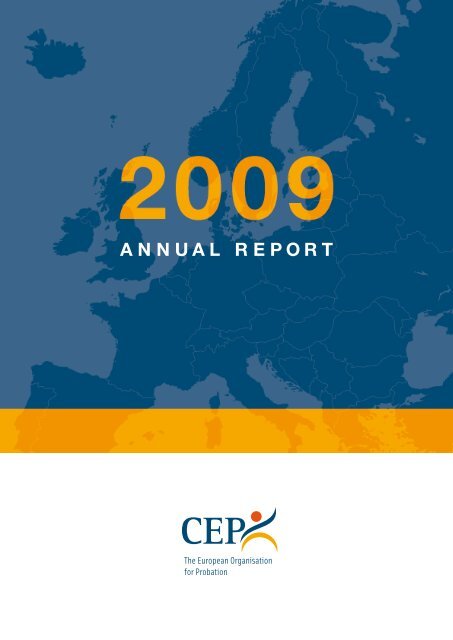

![AGIS2 Nov 08 Conference Report_[Version 2] - CEP, the European ...](https://img.yumpu.com/50764570/1/190x245/agis2-nov-08-conference-report-version-2-cep-the-european-.jpg?quality=85)
